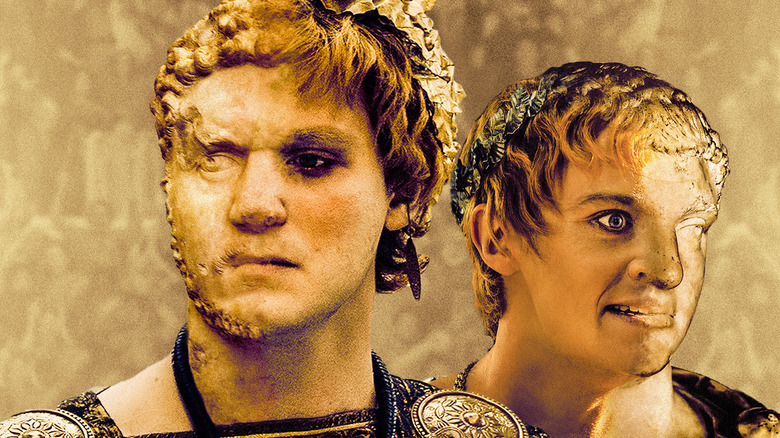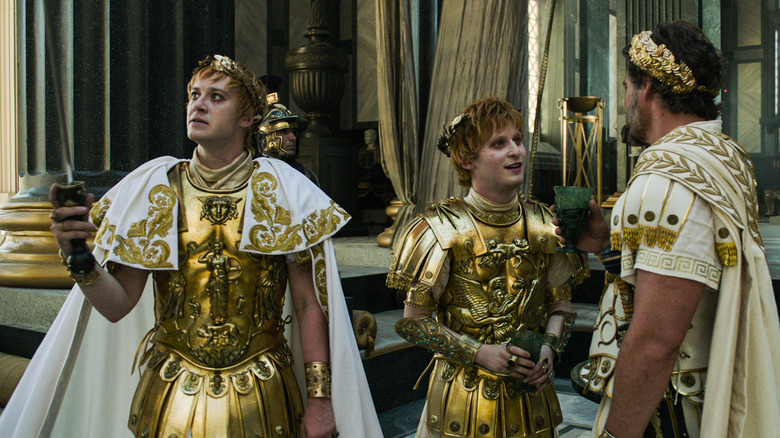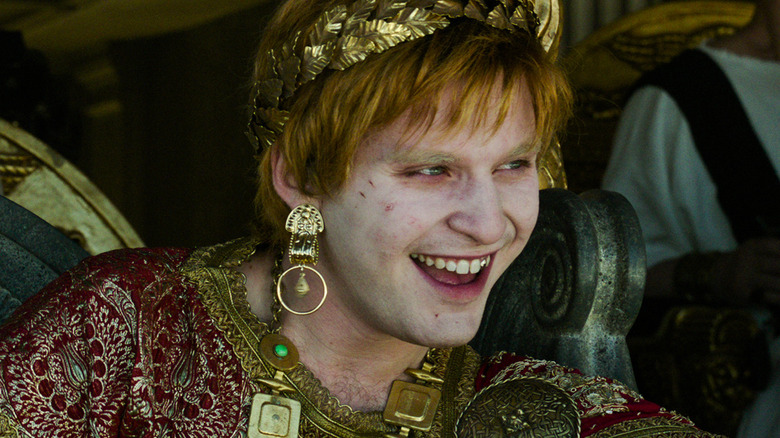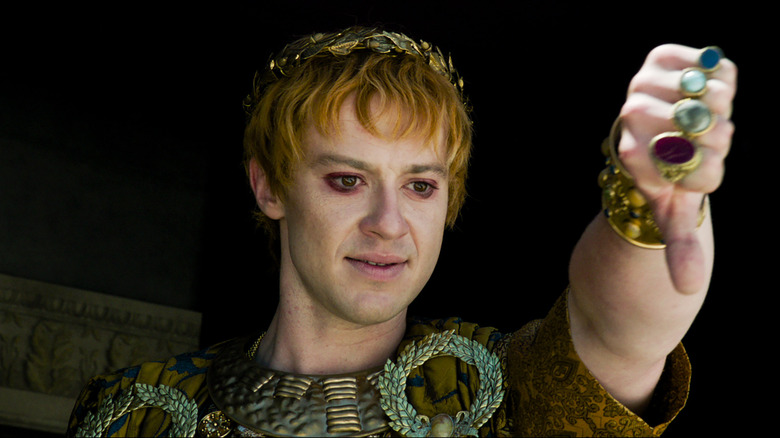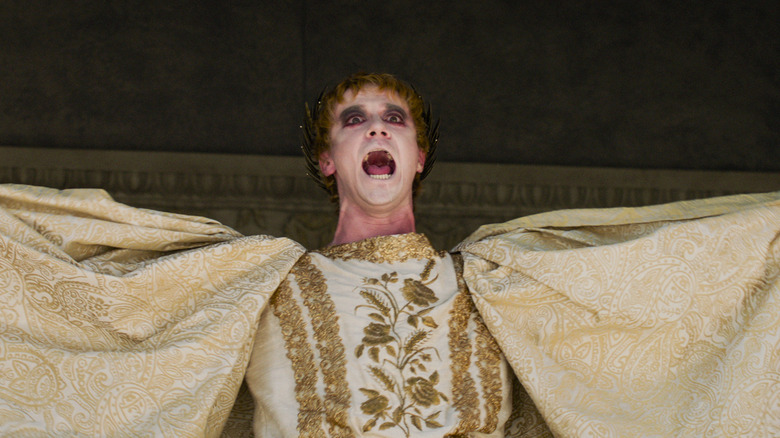Gladiator II's New Emperors Have A Messy Real Life History
The first trailer for "Gladiator II" features heart-racing action and even more heart-racing shots of Paul Mescal's arms. Threatening to upstage both of those things, however, are Joseph Quinn and Fred Hechinger as a pair of flamboyant, makeup-wearing, gold-bedecked young emperors. With their outlandish appearance and demented glee at the violence of the arena, they promise to be the kind of scenery-chewing villains who can elevate a movie from good to great.
Like Joaquin Phoenix's Commodus in the original film, these brats are (loosely) grounded in real-life Roman history. Hechinger and Quinn are playing, respectively, Caracalla and Geta, the sons of Rome's first African emperor, Septimius Severus. Even among the long list of sadists, perverts, and megalomaniacs that ruled over Rome, Caracalla and Geta stand out for having some particularly messy family conflicts, and Scott's decision to cast non-African actors as members of Rome's only African dynasty is also quite messy. Fortunately, we love mess here at Slash Film Dot Com. So, let's dive right in.
Spoilers for the history of the Roman Empire and probably also the plot of "Gladiator II" follow.
Meet Gladiator II's new Roman co-emperors
"Gladiator" and "Gladiator II" director Ridley Scott has a notoriously casual relationship with historical accuracy — and he likes it that way. When Scott was roasted by historians for last year's "Napoleon," he told The Times that those nerds should "get a life" and offered them a simple retort: "Excuse me, mate, were you there? No? Well, shut the f**k up, then."
Still, some broad strokes of the plot of "Gladiator" were true. Commodus was killed by a gladiator, though instead of dying in the heat of arena combat he was poisoned and then strangled to death in a bathtub. Since he died without heirs, his death triggered a tussle for power known as the Year of the Five Emperors. When the dust settled, Septimius Severus emerged as the victor and ruled for almost 18 years before dying of illness in his old age. (That's an impressive run, given how generally backstabby the Roman Empire was.)
Severus named Caracalla as his co-emperor when the boy was just 10 years old. A few years before his death he declared his younger son, Geta, as another co-emperor. His intention was for his two sons to rule together in harmony; in fact, one of his deathbed requests to them was reportedly: "Be harmonious."
They were not.
Caracalla and Geta loathed each other from the start
Septimius Severus' deathbed plea came after years of trying and failing to persuade Caracalla and Geta to be nice to each other. Edward Gibbon's definitive text "The History of the Decline and Fall of the Roman Empire" paints an unflattering picture of the Severus boys:
"The fond hopes of the father, and of the Roman world, were soon disappointed by these vain youths, who displayed the indolent security of hereditary princes; and a presumption that fortune would supply the place of merit and application. Without any emulation of virtue or talents, they discovered, almost from their infancy, a fixed and implacable antipathy for each other."
Caracalla (played by Fred Hechinger in "Gladiator II") is remembered by history as a cruel, tyrannical, and bloodthirsty ruler. Gibbon describes the young Caracalla as a man of "wild ambition and black passions," who more than once tried to hasten the end of his father's rule. His younger brother, Geta (Joseph Quinn), was "milder" and "courted the affections of the people and of the soldiers." But one thing they had in common was their hatred and distrust of each other. After their father died, they split the Imperial palace down the middle and each guarded his half like they were at war. They only ever met in public, surrounded by their bodyguards, fearful of sudden betrayal.
For Geta, these fears proved well-founded. A little less than a year into the Severus brothers' cold war, their mother, Julia Domna, arranged a meeting between her sons in the hope of reconciling them. Caracalla used the meeting as an opportunity to arrange to have Geta slaughtered by assassins. He bled to death in his mother's arms, while Caracalla feigned horror and pretended that they had both been targets of the assassination. No one does scumbaggery like the Romans!
Has Rome's African dynasty been whitewashed in Gladiator II?
Now that's a complicated question, especially since Scott has come under fire for whitewashing in the past. When he was criticized over the mostly-white cast of "Exodus: Gods and Kings," a movie set in North Africa and the Middle East, he responded with his usual diplomacy and tact by telling his critics to "get a life." Scott defended his casting choices in more detail to Variety, arguing, "I can't mount a film of this budget, where I have to rely on tax rebates in Spain, and say that my lead actor is Mohammad so-and-so from such-and-such."
The ethnicity of Septimius Severus is itself a thorny topic within the Roman Empire fandom, not least because it's a fandom with an unfortunate history of attracting white supremacists with a fetishized vision of Rome as the pinnacle of white western civilization. That faction typically attempts to hand-wave away Septimius (and a contemporary portrait that depicts him with deep brown skin) by insisting that he was just a white guy with a tan.
However, characterizations of Septimius Severus as a Black Roman emperor are also somewhat ahistorical. While Africa and Black identity are often treated as synonymous in modern society, the "Africa" of the Roman Empire was limited to a small portion of North Africa that today includes countries like Tunisia, Libya, and Algeria, and was formerly part of the Carthaginian Empire before Carthage was conquered by Rome. We can debate back and forth (and people certainly have) about how much melanin the ancient Carthaginians typically had in their skin, and how much of it would have filtered into Caracalla and Geta's particular blend of Roman, Libyan, and Syrian genetics. But trying to transplant complex modern concepts of race onto Ancient Rome is like trying to stick a triangular block through a square hole.
Geta and Caracalla's fierce imperial fashion
Caracalla and Geta's powdered faces and rouged cheeks in "Gladiator II" open up a whole other historical can of worms: ideas of gender presentation and sexuality in Ancient Rome. Like the subject of race, discussions of how Romans viewed homosexuality and effeminacy in men have been skewed by historians projecting their own culture's values backward in time — and the evidence itself doesn't offer a clear picture.
On the one hand, these traits were used to mock political opponents in court gossip; Curio, a political opponent of Julius Caesar, contemptuously described Caesar as "every woman's man and every man's woman." On the other hand, many Roman emperors had male lovers and even husbands, and paleness may have been seen as a symbol of higher status. The Roman poet Ovid wrote that "a pale complexion ill becomes a sailor," or a farmer, or an athlete. "But every lover should be pale; pallor is the symptom of Love, it is the hue appropriate to Love. So, deceived by your paleness, let your mistress be tenderly solicitous for your health." (Feel free to test Ovid's pick-up tips by plastering your face in white powder and wandering around nightclubs looking sad and ill.)
The Severus boys' use of makeup might be a clue that "Gladiator II" has merged them with their cousin Elagabalus, who became emperor after them. Again, it's difficult to separate historical fact from sassy Roman court gossip, but Elagabalus was reputed to have been highly effeminate to the point of preferring female pronouns, dressing in the clothing of a female sex worker, acting in the role of a wife to a male slave, and even seeking gender-affirming bottom surgery.
So, there are some contentious topics on the table with Caracalla and Geta's presence in "Gladiator II." If I had to place a bet right now, it would be that the movie won't address those topics at all, and instead, the two brothers will just be presented as a straightforward pair of fun, campy villains. All things considered, maybe that's for the best.
